NCCR NORTH-SOUTH DIALOGUES
The NCCR North-South Dialogue Series presents reflections on research topics of concern to programme members throughout the world.
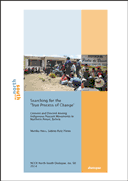
Searching for the ‘True Process of Change’: Consent and Discord Among Indigenous Peasant Movements in Northern Potosí, Bolivia.
NCCR North-South Dialogue No. 50
by Monika Hess and Sabino Ruiz Flores
Seven years after the coming to power of the first indigenous president in Bolivia, Evo Morales, this study looks at indigenous peasant organisations’ strategies, expectations and visions based on their aspiration to pursue local-level development for the grassroots. We explore how indigenous peasant organisations’ influence on the state at the national, departmental and municipal level has increased the
leverage of the marginalized rural population’s concerns. In our case study region, the North of Potosí,...>>More
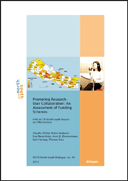
Promoting Research–User Collaboration: An Assessment of Funding Schemes. Fifth NCCR North-South Report on Effectiveness.
NCCR North-South Dialogue No. 49
by Claudia Michel, Maria Paulsson, Eva Maria Heim, Anne B. Zimmermann, Karl Herweg, Thomas Breu
Donors increasingly require that the research they fund be of benefit for society and the environment. To this end, researchers addressing complex and uncertain problems should work together with research users. This is not always easy: researchers are expected to collaborate with non-academic partners, but are not funded for the additional work. Collaborative research projects often cannot tap the full potential of user engagement. Therefore, specific institutional and organisational conditions are necessary that foresee or even foster research–user engagement; funding schemes are one possible solution. Right from the start,...>>More
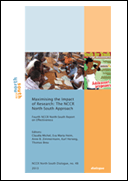
Maximising the Impact of Research: The NCCR North-South Approach. Fourth NCCR North-South Report on Effectiveness.
NCCR North-South Dialogue No. 48
by Claudia Michel, Eva Maria Heim, Anne B. Zimmermann, Karl Herweg, Thomas Breu
Interest is growing in the impact that science can have on reducing poverty in the global South. If we understand impact as the “demonstrable contribution that excellent research makes to society and the economy”, the concept encompasses a variety of contributions of research-related knowledge and skills that benefit people and the environment. Research can indeed influence policymakers’ views, policy development, funding patterns, and implementation or practice. This is promising for those who would like to improve – and prove – the influence research can have on policy and practice. It is also of importance for better understanding the intended and unintended effects of research. This report presents the NCCR North-South approach to increasing the impact of development-oriented research. It explains how we can maximise our impact and how we can assess whether our efforts have worked, based on six case studies from around the world....>>More
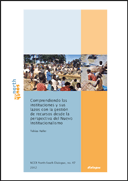
Comprendiendo las instituciones y sus lazos con la gestión de recursos desde la perspectiva del Nuevo Institucionalismo
NCCR North-South Dialogue No. 47
by Tobias Haller
Cuando se trata de temas ambientales, el análisis del uso de recursos renovables frecuentemente se enfoca en el uso irrestricto por la población local que los posee como propiedad comunitaria. Entonces, se cree a menudo que los recursos son percibidos como de libre acceso para todos, conduciendo a la sobre explotación (una “tragedia de los espacios comunes”). Sin embargo, críticas a tal enfoque sostienen que lo común no es de libre acceso, sino usualmente la propiedad de grupos específicos que definen y aplican reglas y regulaciones (instituciones) para la inclusión y exclusión de los usuarios de los recursos. El presente documento considera la Teoría del Nuevo Institucionalismo y cómo ésta ayuda a comprender las estrategias de subsistencia y el cambio institucional con respecto a la gestión de los recursos...>>More
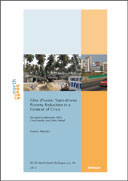
Côte d’Ivoire: State-driven Poverty Reduction in a Context of Crisis—Navigating Between MDG Constraints and Debt Relief
NCCR North-South Dialogue No. 46
by Francis Akindès
In 2000 the Ivorian government committed to achieving the MDGs. In 1997 it had already determined strategic areas for combating poverty according to the Poverty Reduction Strategy Papers process. These economic reforms were undertaken in the hope of partial debt relief through the Heavily Indebted Poor Countries (HIPC) initiative. From 2002-2011, 3 severe socio-political crises hampered Côte d’Ivoire’s growth. Reports show that the results achieved in the fight against poverty are not conclusive after 10 years of poverty reduction strategies and...>>More
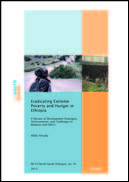
Eradicating Extreme Poverty and Hunger in Ethiopia: A Review of Development Strategies, Achievements, and Challenges in Relation with MDG1
NCCR North-South Dialogue No. 45
by Aklilu Amsalu
Ethiopia was one of the developing countries of the world that adopted the Millennium Declaration in 2000. Since then, the country has entered into a political commitment to introduce appropriate strategies that will help achieve the MDGs. Poverty reduction is one of Ethiopia’s major development challenges. The country developed PRSPs (Poverty Reduction Strategy Papers) in order to deal with extreme poverty and hunger in line with the targets set in the MDGs. However, despite an impressive growth record...>>More
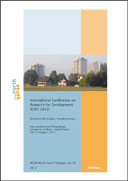
International Conference on Research for Development (ICRD 2012): Research for Global Transformation
NCCR North-South Dialogue No. 44
by NCCR North-South
As the Rio+20 United Nations Conference on Sustainable Development (UNCSD) confirmed, sustainable development cannot be solely achieved by technical, regulatory, or financial means. The challenges of global change demand sound development-oriented knowledge and innovation. This combined with evidence-based negotiations between stakeholders at all levels is the only path to global transformation.
The 3rd International Conference on Research for Development (ICRD 2012) – organised by the NCCR North-South – brings together over 300 researchers and representatives from development agencies, civil-society organisations, and the private sector. Its aims are to share the latest insights on development-oriented research conducted in North–South partnerships and to outline...>>More
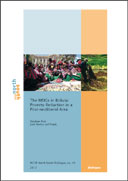
The MDGs in Bolivia: Poverty Reduction in a Post-neoliberal Area
NCCR North-South Dialogue No. 43
by Stephan Rist, José Nuñez del Prado
From 1986 to 2005, Bolivia struggled under neoliberal policies. Local indigenous people – about 64% of the population – resisted and sought ways of organising beyond the system of representative democracy, which was dominated by white and mestizo elites. They developed indigenous social movements and expressed the need for a new “social contract” and constitution. Their main strategy was direct political action: marches, demonstrations, road blockings, hunger strikes, and mass mobilisation. A democratic “system change” finally occurred...>>More
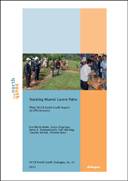
Tracking Alumni Career Paths: Third NCCR North-South Report on Effectiveness
NCCR North-South Dialogue No. 42
by Eva Maria Heim, Sonja Engelage, Anne B. Zimmermann, Karl Herweg, Claudia Michel, Thomas Breu
Where are they now? After a decade of investment in capacity development of Southern PhD students, the Swiss National Centre of Competence in Research (NCCR) North-South wanted to find out what had become of its alumni. The findings were surprising, and contradicted the widespread assumption that a research programme such as this perpetuates a class of elites in the South by enabling only students from higher social strata to further consolidate their favourable position in society. A survey of 83 former PhD students clearly showed that the NCCR North-South has given people in disadvantaged positions in developing countries a chance to advance their careers. Obtaining a PhD produced a career boost among alumni in the South. Most crucially, the NCCR North-South did not contribute to the phenomenon of brain drain: more than 90% of Southern alumni questioned were working in a Southern country. Moreover, the majority of alumni in the North and South continued to work in a field related to sustainable development...>>More
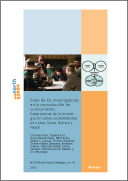
Roles de los investigadores en la coproducción de conocimiento: Experiencias de la investigación sobre sostenibilidad en Kenia, Suiza, Bolivia y Nepal
NCCR North-South Dialogue No. 41
by Christian Pohl, Stefan Rist, Anne Zimmermann, Patricia Fry, Ghana Gurung, Flurina Schneider, Chinwe Ifejika Speranza, Boniface Kiteme, Sebastien Boillat, Elvira Serrano, Gertrude Hirsch-Hadorn, Urs Wiesmann
La coproducción de conocimiento entre las comunidades académicas y no-académicas es un requisito previo para la investigación dirigida a caminos de desarrollo más sostenibles. Los investigadores de la sostenibilidad enfrentan tres desafíos en dicha coproducción: (a) el abordar las relaciones de poder; (b) la interrelación de diferentes perspectivas acerca de los temas en juego y (c) la promoción de una orientación negociada previamente hacia el desarrollo sostenible. Una comparación sistemática de cuatro proyectos de investigación sobre sostenibilidad....>>More
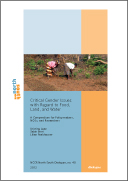
Critical Gender Issues with Regard to Food, Land, and Water: A Compendium for Policy-makers, NGOs, and Researchers
NCCR North-South Dialogue No. 40
by Kristina Lanz, Sabin Bieri, Lilian Fankhauser
This document is divided into three glossaries concerning land, food, and water. Each glossary provides short and precise information on subjects which are of relevance to researchers, policy-makers, and development practitioners working in these three fields. Issues such as food security, land rights and land grabs, climate change, and water and sanitation are taken up and elucidated from a gender perspective. In each glossary, case studies help to highlight important issues. Furthermore, policy recommendations aimed at different stakeholders are provided at the end of each glossary. The individual glossaries aim to provide....>>More
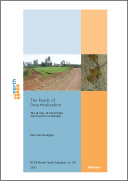
The Roads of Decentralisation: The History of Rural Road Construction in Ethiopia
NCCR North-South Dialogue No. 39
by Rony Emmenegger
Roads, in particular rural roads, play a major role in development. In Ethiopia, where the vast majority of the population depends on agricultural production, this is even more so, and the country’s road network has become a major policy issue with significant consequences for the population. An extensive network of 114,397 km of different roads has been constructed, maintained, and classified to date. Although community roads account for nearly two-thirds of the country’s total road network, virtually no work deals specifically with issues related to their construction. In an attempt to address this lack of information, this paper traces the history of the classified road network and of the governmental sector that has been in charge of its construction, in order to shed light on....>>More
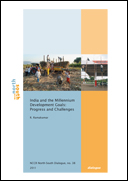
India and the Millennium Development Goals: Progress and Challenges
NCCR North-South Dialogue No. 38
by R. Ramakumar
This paper argues that India has been off-track in terms of most indicators captured in MDG-1. The failure of the Indian state to meet MDG targets is not just a technical failure; it represents a historic failure of the state to raise the living standards of people and expand their socioeconomic freedoms. First, beginning from the assumption that poverty is primarily a structural issue, India’s failure to implement land reforms on any substantial scale or degree has historically undermined its efforts to create any dent on poverty and unemployment....>>More
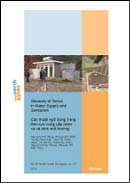
Glossary of Terms in Water Supply and Sanitation (in Vietnamese)
NCCR North-South Dialogue No. 37
by Nguyen Viet Hung, Hoang Van Minh, Vuong Tuan Anh, Tran Thi Tuyet Hanh, Vu Van Tu, Pham Duc Phuc, Nguyen Hong Nhung, Nguyen Thi Bich Thao
This document aims at developing a comprehensive English–Vietnamese glossary of terms in the field of water and sanitation. Its purpose is to create a platform to facilitate exchange among people working in this field in Vietnam and to reach a consensus about the various definitions and translations proposed in the present glossary. We welcome feedback from colleagues and organisations throughout Vietnam and thank readers for their valuable contributions to what will hopefully become a standard English–Vietnamese water and sanitation glossary....>>More
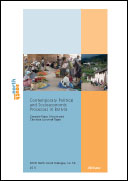
Contemporary Political and Socioeconomic Processes in Bolivia
NCCR North-South Dialogue No. 36
by Gonzalo Rojas Ortuste and Christian Lunstedt Tapia
This paper presents an account of the persistence of poverty and inequality in Bolivia and related efforts taken by the state. Its focus is on the current government headed by Evo Morales and the MAS with its strong reference to indigenous peoples. A historic perspective highlights continuities and disjunctures in Bolivia’s social and economic politics...>>More
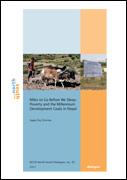
Miles to Go Before We Sleep: Poverty and the Millennium Development Goals in Nepal
NCCR North-South Dialogue No. 35
by Sagar Raj Sharma
Nepal is one of the 189 countries that have committed to achieving the MDGs by 2015. This pledge was most recently renewed in the government’s Three Year Plan 2010/11 – 2012/13. Nepal’s commitment can also be judged, to some extent, by the fact that despite having been engulfed by violent conflict, political instability and rapidly changing socio-political structures since the time it endorsed the MDGs, it has consistently incorporated the MDGs into the strategic framework of the country’s Tenth Plan (2002/03 – 2006/07), Poverty Reduction Strategy Paper (PRSP), and the Three-year Interim Plan 2007/08 – 2009/10....>>More
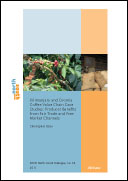
Kilimanjaro and Oromia Coffee Value Chain Case Studies: Producer Benefits from Fair Trade and Free Market Channels
NCCR North-South Dialogue No. 34
by Christopher Coles
As part of a transversal research project exploring coffee value chains in Tanzania, Ethiopia and Kenya, this study traced Fair Trade and open market coffee value chains in Kiliman-jaro Region, Tanzania and in Jimma Region, Ethiopia. It compares the governance frameworks and benefit distribution among actors in both chains...>>More
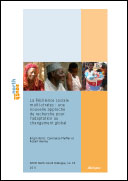
La Résilience sociale multi-strates : une nouvelle approche de recherche pour l’adaptation au changement global
NCCR North-South Dialogue No. 33
by Brigit Obrist, Constanze Pfeiffer, Robert Henley
La recherche sur le développement durable tend à se focaliser sur les notions de risque et de vulnérabilité. Dans cet article, l’argumentaire propose un déplacement
de l’attention de la vulnérabilité vers la résilience. Il développe un cadre de réflexion qui présente la resilience sociale multi-strates : celle-ci met l’accent sur les...>>More
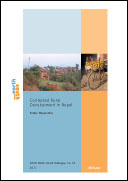
Contested Rural Development in Nepal
NCCR North-South Dialogue No. 32
by Prabin Manandhar
This Working Paper maps out debates on rural development in Nepal. The Paper reviews poverty, inequality and exclusion, contemporary rural life and rural development via the state, non-state actors and movements, and experiences of rural people. Nepal is a multi-lingual, multi-religious, multi-ethnic and multi-cultural country, but at the same time, it is argued that the 'melting pot' concept of inclusion is not a pragmatic approach...>>More
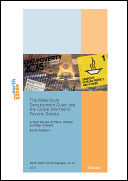
The Millennium Development Goals and the Global (Northern) Poverty Debate. A Short Review of Praise, Critique and Ways Forward
NCCR North-South Dialogue No. 31
by Bernd Steimann
In 2000, 189 UN member states signed the United Nation's Millennium Declaration and committed to working towards achievement of the Millennium Development Goals (MDGs) – a set of eight time-bound global development goals to be achieved by 2015. Since then, the MDGs and their catchy objective of "halving poverty by 2015" (MDG-1) have become the leading global development policy framework...>>More
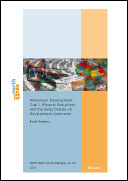
Millennium Development Goal 1 (Poverty Reduction) and the Swiss Debate on Development Assistance
NCCR North-South Dialogue No. 30
by Bernd Steimann
In 2000, along with 188 other national governments, Switzerland signed the United Nation‘s Millennium Declaration and committed to working towards achievement of the eight Millennium Development Goals (MDGs). Despite their comprehensive character, however, the MDGs have received only limited attention since then and have remained widely unknown among the Swiss public. Based on a review of official reports...>>More
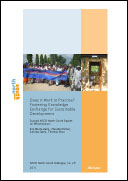
Does it Work in Practice? Fostering Knowledge Exchange for Sustainable Development
Second NCCR North-South Report on Effectiveness
NCCR North-South Dialogue No. 29
by Eva Maria Heim, Claudia Michel, Annika Salmi, Thomas Breu
Does it work in practice? Many researchers are not given the opportunity to find out: they often lack the time and financial resources to work beyond the academic realm. To ensure that research results are not confined to university bookshelves, the NCCR North-South introduced “PAMS” right from the start of the programme. PAMS – Partnership Actions for Mitigating Syndromes – are small projects…>>More
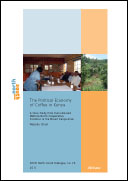
The Political Economy of Coffee in Kenya. A Case Study from Rumukia and Mathira North Cooperative Societies in the Mount Kenya Area
NCCR North-South Dialogue No. 28
by Wanjiku Chiuri
Kenyan coffee used to be the main foreign exchange earner in the 1970s and 1980s, before losing out to tourism and tea in subsequent decades. However, many coffee farmers are still dependent on the crop and are trapped in a cycle of poverty: they hang on to coffee, which is no longer aying for its production costs... >>More
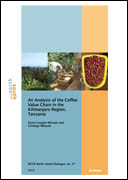
An Analysis of the Coffee Value Chain in the Kilimanjaro Region, Tanzania
NCCR North-South Dialogue No. 27
by David Gongwe Mhando and Gimbage Mbeyale
This report focuses on coffee producers in two villages in the Kilimanjaro area, Tanzania. The Kilimanjaro region is well known historically in Tanzania for coffee production. However, coffee production in Kilimanjaro, which is based on smallholder production, has declined over the years as a result of... >>More
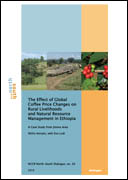
The Effect of Global Coffee Price Changes on Rural Livelihoods and Natural Resource Management in Ethiopia
NCCR North-South Dialogue No. 26
by Aklilu Amsalu and Eva Ludi, 2010
This report is about coffee producers in three villages in Jimma Zone in the highlands of Ethiopia. Ethiopia is known for its high-quality coffee which is much sought after by speciality buyers. Over 60% of Ethiopia’s foreign earnings are generated by coffee export and the sector directly and indirectly provides a livelihood... >>More
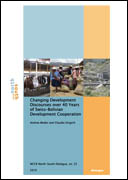
Changing Development Discourses over 40 Years of Swiss–Bolivian Development Cooperation
NCCR North-South Dialogue No. 25
by Andrea Weder and Claudia Zingerli, 2010
This Dialogue paper looks back on the history of 40 years of Swiss-Bolivian development cooperation. Adopting a discourse analysis approach, the study detects moments of change and ruptures in the international, Swiss, and Bolivian development discourses, and analyses the implications of these changes for Swiss development cooperation in Bolivia... >>More
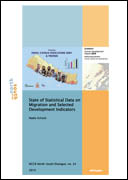
State of Statistical Data on Migration and Selected Development Indicators
NCCR North-South Dialogue No. 24
by Nadia Shoch, 2010
Migration and its interlinkages with development has become a topic of high interest for researchers as well as policymakers in the last few years. In the global South, topics such as emigration in combination with remittances, brain drain/gain and circulation, and... >>More
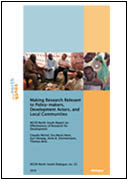
Making Research Relevant to Policy-makers, Development Actors, and Local Communities
NCCR North-South Report on Effectiveness of Research for Development
NCCR North-South Dialogue No. 23
by Claudia Michel, Eva Maria Heim, Karl Herweg, Anne Zimmermann, Thomas Breu, 2010
Bridging the gap between research and policy is of growing importance in international development. The National Centre of Competence in Research (NCCR) North-South has rich experience in collaborating beyond academic boundaries to make their research relevant to various... >>More
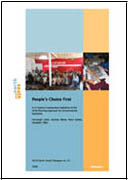
People’s Choice First
A 4-Country Comparative Validation of the
HCES Planning Approach for Environmental
Sanitation
NCCR North-South Dialogue No. 22
by Christoph Lüthi, Antoine Morel, Petra Kohler, Elizabeth Tilley, 2009
From 2006 until the end of 2008, the participatory Household-Centered Environmental Sanitation approach (HCES) was tested in 7 different urban and periurban sites across Africa, Asia and Latin America... >>More
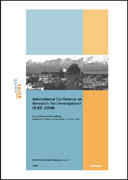
International Conference on Research for Development (ICRD 2008)
Pre-conference Proceedings. University of Bern, Switzerland, 2–4 July 2008
NCCR North-South Dialogue No. 21
by NCCR North-South, 2008
The International Conference on Research for Development (ICRD 2008) brings together more than 250 researchers, representatives from development agencies, civil society organisations and the private sector to share research results, concepts, methodologies, and pilot experiences... >>More
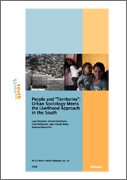
People and “Territories”
Urban Sociology Meets the Livelihood Approach in the South
NCCR North-South Dialogue No. 20
by Luca Pattaroni, Vincent Kaufmann, Yves Pedrazzini, Jean-Claude Bolay, Adriana Rabinovich, 2008
The process of urbanisation is a global phenomenon in constant progression around the world; however, it distinguishes itself today in developing countries through its particular speed, scope and consequences in terms of spatial fragmentation and social exclusion. In this paper, we develop a framework for analyzing these phenomena... >>More
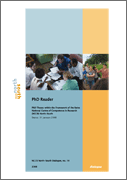
PhD Reader
PhD Theses within the Framework of the Swiss National Centre of Competence in Research (NCCR) North-South
NCCR North-South Dialogue, No. 19
by NCCR North-South, 2008
This PhD Reader compiles the titles of all PhD theses in progress and the summaries of completed theses. The titles are arranged by theme and the summaries by region. The document contains research results of fundamental relevance for development studies. Researchers in partnerships for sustainable development will find it a useful compilation of insights into pressing problems of global change, while representatives of development agencies will find a quick overview of research done in their field or region of practice... >>More
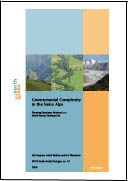
Governmental Complexity in the Swiss Alps: Planning Structures Relevant to a World Natural Heritage Site
NCCR North-South Dialogue No. 18
by Jöri Hoppler, Astrid Wallner, Urs Wiesmann, 2008
In 2001 the Jungfrau-Aletsch-Bietschhorn region was inscribed on the World Heritage List of the UNESCO World Heritage Committee as the first World Natural Heritage Site in the Swiss Alps (now called the Swiss Alps Jungfrau-Aletsch World Heritage Site). This paper examines governmental planning tools and structures concerned with the WHS management strategy... >>More
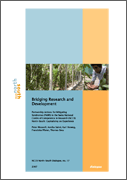
Bridging Research and Development
Partnership Actions for Mitigating Syndromes (PAMS) in the NCCR North-South – Capitalising on Experience.
NCCR North-South Dialogue, No. 17
by Peter Messerli, Thomas Breu, Karl Herweg, Franziska Pfister, Annika Salmi, 2007
Within the framework of Switzerland’s international NCCR North-South research programme, Partnership Actions for Mitigating Syndromes (PAMS) are a practice-oriented component with a transdisciplinary approach. By linking research and development practice, they bring together researchers, practitioners and local communities in a common effort to test and evaluate research findings in concrete development contexts... >>More

Conducting Field Research in Contexts of Violent Conflict. An Annotated Bibliography
NCCR North-South Dialogue No. 16
by Nathalie Gasser
This annotated bibliography focuses on literature con-cerned with strategies for conducting field research in social contexts characterised by highly polarized conflicts. This is a topic largely neglected by the literature on qualita-tive field research. The bibliography consists of literature that is mainly, but not exclusively, concerned with field research in violently divided societies. Reflections on the subject are shaped by two main disciplinary approaches: (1) social anthropological research, and (2) “applied” development-oriented research. From a historical perspective, social anthropology is the discipline from which the practice of systematic field research emerged, mainly through the method of participatory observation. It is therefore not surprising that...>>More
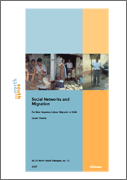
Social Networks and Migration
Far West Nepalese Labour Migrants in Delhi
NCCR North-South Dialogue, No. 15
by Susan Thieme, 2007
In Far West Nepal – an area extremely impoverished even by Nepalese standards – labour migration to India has been an integral part of the livelihood strategies of the majority of the people for several generations. This paper is based on case studies among male and female migrants in Delhi who came from four villages in Far West Nepal. The analysis focused on selected aspects of the migrants’ daily lives, such as working and living conditions, management of loans and savings, and remittance transfers...>>More

Searching for the ‘True Process of Change’: Consent and Discord Among Indigenous Peasant Movements in Northern Potosí, Bolivia
NCCR North-South Dialogue No. 14
by Yacob Arsano
The Nile waters system consists of numerous tributaries and headwater lakes. The Ethiopian headwaters provide 86% of the annual volume of the waters of the Nile, while the remaining 14% comes from the Equatorial Lakes region through the White Nile system. Egypt and Sudan are net recipients of the Nile waters that come down from the two headwater sub-systems. In accordance with the Nile Basin Initiative (NBI) the basin is divided into two sub-basins, i.e. the Eastern Nile Basin and the Equatorial Nile Basin. No institutional and legal mechanisms to regulate the utilisation and management of the Nile’s water resources exist. The absence of a legal and institutional framework and...>>More

Political Ecology in Development Research. An Introductory Overview and Annotated Bibliography
NCCR North-South Dialogue No. 13
by Jon Schubert
This paper summarises the trends and debates of the past 20 years or so in the field of Political Ecology (PE). A critical review of the different existing strands of research provides a summary of the relatively diverse and sometimes competing theoretical approaches in this area. Researchers and practitioners engaged in the analysis of human-nature interactions will find this overview useful when selecting comparable case studies and identifying adequate theoretical tools for their work. The paper is ...>>More

Marginality: Concepts and their Limitations.
NCCR North-South Dialogue No. 12
by Ghana S. Gurung, Michael Kollmair
Both spatial and societal marginality persist around the globe, even though the type and scale of occurrence may differ depending on the physical and social setting. Re-searchers within the NCCR North-South use the concept of marginality in different ways; the present paper explores marginality with the aim of enhancing understanding and common use of the concept in the field of inter- and trans-disciplinary scientific research. It briefly defines and de-scribes the basic concepts of marginality, based on a literature review and inputs from the participants in various workshops of the NCCR North-South, and attempts to pro-vide some key answers to...>>More
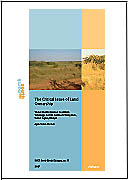
The Critical Issue of Land Ownership
Violent Conflict between the Abdalla Tolomogge and the Awlihan in Godey Zone, Somali Region, Ethiopia
NCCR North-South Dialogue No. 11
by Gebre-Mariam Ayele, 2007
The present publication presents the results of a study that explored the conflict situation between agro-pastoralist and pastoralist clans in the Somali region in eastern and southeastern Ethiopia... >>More

Livelihood Strategies in North-West Pakistan. Results from the Sustainable Livelihood Survey 2004, North-West Frontier Province (Pakistan)
NCCR North-South Dialogue No. 10
by Bernd Steimann
People in rural areas of Pakistan’s North-West Frontier Province (NWFP) often live under very difficult conditions, with a per capita income among the lowest in the whole country. The terrain is often rugged and impassable, not always suitable for cultivation, and the infrastructure is in rather poor condition. Thus, access to food and public services is very much limited in the region – the more so for women, who are subject to strict social control in many areas. In addition, forests, which are often a key resource for construction and...>>More

Forestry in the Princely State of Swat and Kalam (North-West Pakistan). A Historical Perspective on Norms and Practices
NCCR North-South Dialogue No. 9
by Sultan-i-Rome
The historic Swat Valley in North-West Pakistan and the adjoining areas which were later incorporated into Swat State, have been rich in forests since early times. These forests remained intact for centuries if not millennia. The 19th century proved to be a turning point: outsiders, most-ly the Kaka Khel Mians, began to exploit the forests through forest operations and export the timber. By the beginning of the 20th century, the frontier colonial authorities became alarmed at the negative impacts of the ruthless cutting of trees in the forests of Swat and adjoining areas and...>>More

An Overview of Different Vulnerability Approaches and Definitions
NCCR North-South Dialogue No. 8
by Martin Cassel-Gintz
This paper provides an overview of the development of the concept of vulnerability and related concepts for discussion in the NCCR North-South. It draws on various activities related to concepts of vulnerability during the first phase of the NCCR North-South programme (2001-2004), and attempts to provide ideas for a usable framework for the second phase.
Vulnerability is one of the overarching concepts used in the programme. The fact that it is used by different researchers in different projects, and therefore by different disciplines, already suggests that there is no single vulnerability con-cept but a multitude of different approaches and concepts dealing with vulnerability in circulation among members of the programme. The paper introduces those concepts that...>>More
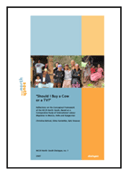
Should I Buy a Cow or a TV?” Reflections on the Conceptual Frame-work of the NCCR North-South, Based on a Comparative Study of International Labour Migration in Mexico, India and Kyrgyzstan
NCCR North-South Dialogue No. 7
by Christine Bichsel, Silvia Hostettler, Balz Strasser
The relationship between international migration and its developmental impact in the country of origin has repeatedly been termed “unsettled” or “unresolved”. Despite considerable research in this area, the debate about whether migration is fostering or hindering development continues. In the NCCR North-South research programme, migration has been designated as a core problem of sustainable development, while recognising that it can also represent an opportunity for families trying to secure a livelihood. We argue that...>>More
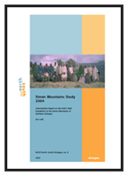
Simen Mountains Study 2004: Intermediate Report on the 2004 Field Expedition to the Simen Mountains in Northern Ethiopia
NCCR North-South Dialogue No. 6
by Eva Ludi
The purpose of the Simen Mountains Study 2004 was to re-assess specific bio-physical and socio-economic conditions in selected villages inside and around the Simen Mountains National Park that had previously been studied in the Simen Mountains Baseline Study in 1994.
Besides presenting preliminary findings on the major themes investigated, this report also presents a preliminary assessment of major changes and trends with regard to wildlife, natural resources, land use, human population and livestock, institutions, and tourism. At this moment – i.e. before main findings are available – it can be concluded that enormous efforts have been initiated by the regional and local governments, partly supported by bilateral and international donor agencies, to improve the living conditions of the resident population and improve conditions in the National Park, its management, and...>>More
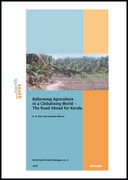
Reforming Agriculture in a Globalising World – The Road Ahead for Kerala
NCCR North-South Dialogue No. 5
by K. Narayanan Nair and Vineetha Menon
Against the backdrop of anxieties and optimistic anticipa-tions about the impact of trade liberalization on agricultural in India in general and the state of Kerala in particular, this paper examines the growth performance of Kerala’s agricul-ture and the underlying factors relating to the comparative advantages and disadvantages of major agricultural com-modities in the state, price fluctuations, and the implica-tions of trade liberalization for the state’s agriculture. The role of the state in ensuring food security and sustainability through various measures to improve agricultural produc-tivity and ensure price and product advantages, and ...>>More
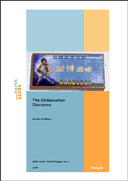
The Globalisation Discourse
NCCR North-South Dialogue No. 4
by Norman Backhaus
Globalisation is often regarded as something that comes from the outside and that is mostly driven by economic factors. This paper argues that globalisation is more than just that: it has much to do with everybody’s daily lives and is shaped by everyday actions. Globalisation is not simply a topical concept: it has become ...>>More
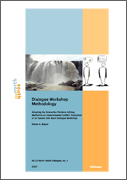
Dialogue Workshop Methodology
Adapting the Interactive Problem-Solving Method to an Environmental Conflict: Evaluation of an Eastern Nile Basin Dialogue Workshop
NCCR North-South Dialogue, No. 3
by Simon A. Mason, 2007
Participatory resource and conflict management is one of the greatest challenges of our time. If stakeholders are not involved in this process, solutions will not be locally legitimised, or sustainable. “Dialogue Workshops” are one form of participatory resource and conflict management. The present paper summarises the theory behind this method, and describes its application in the Eastern Nile Basin with participants from Egypt, Sudan and Ethiopia... >>More
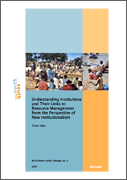
Understanding Institutions and Their Links to Resource Management from the Perspective of New Institutionalism
NCCR North-South Dialogue, No. 2
by Tobias Haller, 2007
When environmental issues are at stake, analysis of renewable resource use frequently focuses on unrestricted use by local people who hold them as commons. It is then often believed that resources are perceived as free for all, leading to the overuse of resources (a “tragedy of the commons”). However, critiques of such approaches argue that commons are not open access but usually the property of specific groups who define and enforce rules and regulations (institutions) for inclusion and exclusion of resource users... >>More
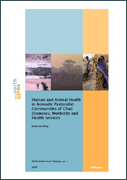
Human and Animal Health in Nomadic Pastoralist Communities of Chad: Zoonoses, Morbidity and Health Services
NCCR North-South Dialogue, No. 1
by Esther Schelling, 2007
The health of nomadic pastoralists is influenced by factors specific to their way of life. Nomadic pastoralists depend on livestock for subsistence, especially livestock milk. Veterinary services vaccinate against feared livestock diseases such as anthrax. Pathogens transmissible between livestock and humans (zoonotic agents) may have an important impact on the health of pastoralists because they live in close contact with their animals... >>More